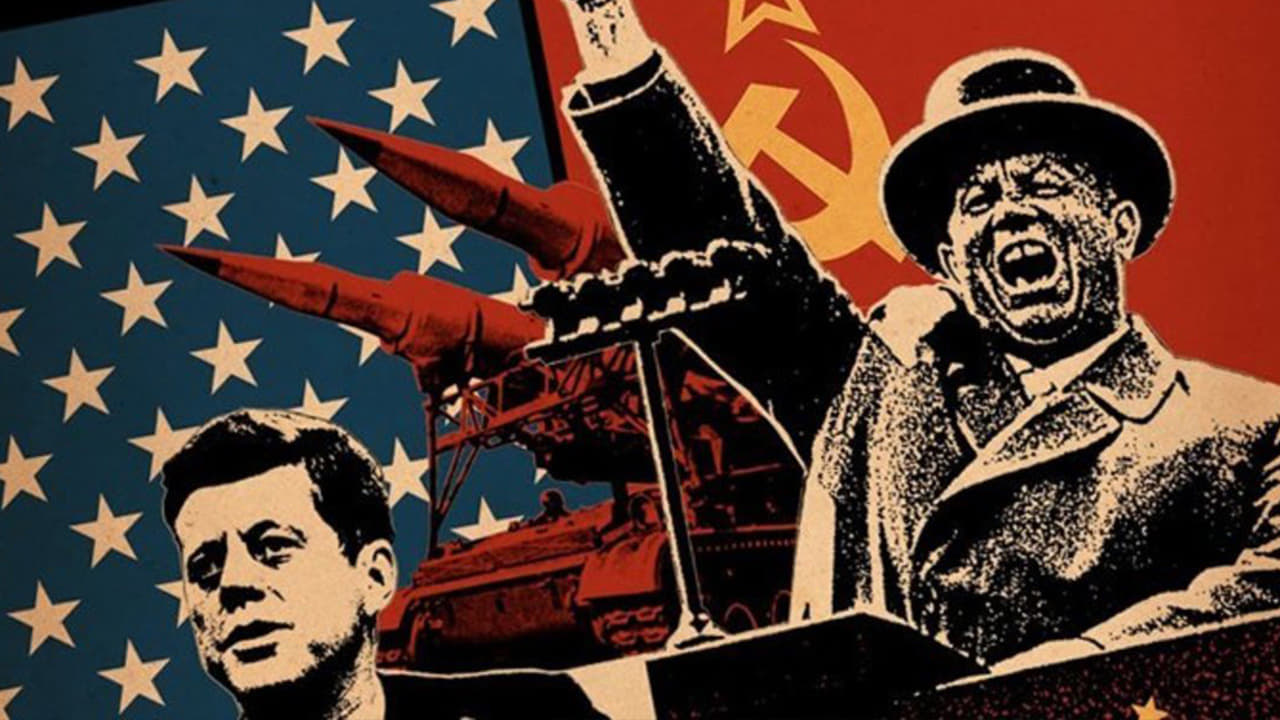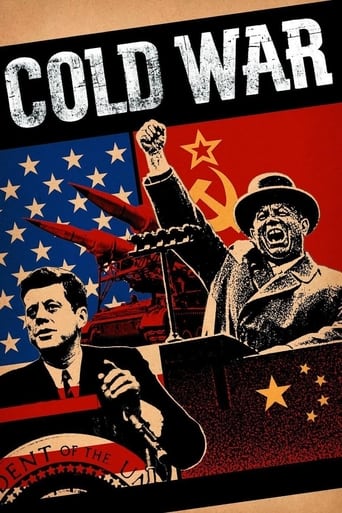Lancoor
A very feeble attempt at affirmatie action
Stephan Hammond
It is an exhilarating, distressing, funny and profound film, with one of the more memorable film scores in years,
Jemima
It's a movie as timely as it is provocative and amazingly, for much of its running time, it is weirdly funny.
G K
Modeled on the British anti-Russian World At War (1973) documentary series, the Cold War series provides a review of the war that defined the second half of the 20th century. Jeremy Isaacs produced this 1998 program.While at least showing some of what happened during the Cold War this documentary doesn't reach the right conclusions about the war. The thing is that the Cold War was started by the West, and serious people in the West admit it. The Soviet Union didn't have the financial or military means to oppose the West after World War II. In addition, the West has abilities that Russia didn't have even when she was part of the Soviet Union. For example, Western special-forces can overthrow governments in countries on the other side of the planet. Soviet special-forces couldn't do this. In a few cases they financed revolutionaries but they couldn't overthrow governments like the British and the Americans did in Iran, Guatemala, Chile and other countries. There were also cases when British and American special-forces acted against movements and people in Europe. For example, it's now known that they assassinated politicians in Italy and Greece. It's well known that after the war ended the United States became a global hegemon and a more aggressive imperialist power. I don't want to bash the USA much, so I will mention that America's ruling class of financial and monopoly capitalists is influenced by London and MI6. The CIA is really a branch of MI6. Franklin D. Roosevelt and John F. Kennedy were murdered by the British because they often opposed the London center of management. Much of the time America's actions are a result of British control or influence. The Soviet Union may be gone but America continues to target Russia as an enemy. Fears of a nuclear war are reviving, and we're seeing a lot of propaganda. It's no accident that now we're being bombarded by gross historic falsifications and lies about the Soviet Union and especially about Joseph Stalin. After all, it was Stalin who built the Soviet system and who thwarted the plans of the globalist Western elites. One of the errors this documentary makes is that it portrays the war as an armed struggle. In reality it was a war of propaganda and information, and the West was much better at this than the Soviet Union. Western propaganda convinced much of the world that the Soviet Union was an 'evil empire' and a 'prison for nations' even though this was certainly not the case. The West was, and continues to be, a much more aggressive bloc. In short this documentary is just another piece of Western propaganda. It aims to present the United States as the rightful winner, and completely ignores very important sociological and economic factors. A lot of information has come out since this documentary was released. This is mostly thanks to the internet, because for now independent voices can be heard on the internet. Still, it's not easy to find these voices and there's a lot of propaganda on the internet too. Some neoconservatives criticized the series by claiming that it dares to show the United States as an aggressor and that it leans to the left. This isn't true. If anything, this documentary is very much pro-Western because it ignores A LOT of bad Western behavior before, during and after the Cold War. It also gives a critical, slanted or untrue account of what happened in the Soviet bloc and in China.The collapse of the USSR is also a very interesting conspiratorial question. This can only be understood by analyzing the global capitalist system of the second half of the 20th century. Mikhail Gorbachev was the weak and treacherous general secretary who surrendered Eastern Europe and the Soviet Union to the West, but all of this was not just his idea. He was a Western agent but also a puppet of those in the Soviet system who wanted to integrate into the capitalist system as welcomed guests and who wanted to become proprietors. The West played a role in making Gorbachev general secretary and also caused a few difficulties for the Soviet economy, especially by reducing the price of oil. Oil was the Soviet Union's major export at that time. The Soviet Union was not doomed for defeat but Western propaganda is certainly trying to make it seem like it was, and that its state socialism was the cause of this. In reality, it was this same state socialism which transformed Russia into a superpower and the second largest world economy. Western propaganda is very active in portraying Gorbachev as a liberator instead of the traitor that he was. Gorbachev celebrated his 80th birthday in London and he was given a medal by the United States Congress for practically destroying the Soviet Union. So, it's important to note that the Soviet Union didn't just collapse. The Soviet system was dismantled and overthrown by pro-Western people in the Soviet government itself, who acted with considerable support from Western business and special-forces. It's not much different from how governments in Iran and Guatemala were overthrown by Western special-forces. The Soviet Union had structural problems but the coup d'etat was possible only because of factors coming from the West. The collapse of the Soviet Union resulted in extremely tough times for Russia, and Russia pretty much became a cultural and economic colony of the West. Oligarchs and even traitors became the new rulers of Russia in the 1990s. The well-known Russian philosopher Aleksandr Zinovyev wrote that the West, headed by the United States, is a more dangerous enemy for Russia than Adolf Hitler was. But things weren't all good for America either because serious economic trouble for the United States began as early as the late-1960s. In any case, if one wants to really understand what's going on one should read books by American historian Carroll Quigley.
classickai
Excellent documentary series! I found this series at my local library, and it's an excellent primer for the events of the so-called "Cold War" from the beginning to the end. Contemporary footage is successfully mixed in with many interviews of still-living witnesses/participants of history, and Kenneth Branagh's voiceovers keep the viewer up to date on every crucial detail.If you've ever been interested in learning the real historical background behind John le Carre's and Ian Fleming's spy novels, this is the series that will bring you up to date. CNN also has a Cold War website with further information, as well as a list of books which one may wish to borrow from the library to learn still more about specific events.I borrowed two videos at a time and watched them in order, and I was never disappointed. If you love history as much as I do, you'll love this documentary series!
Jakeroo
It certainly is the best on the subject. Interspersing newsreels and film with interviews of participants ranging from Gorbachev to Castro to Carter is extremely effective. Even McNamara is in it giving his views on many aspects of the Cold War. How ironic to call it "cold" when it was very HOT in so many places around the world! If you have any interest in world developments since WWII, you will not be disappointed by this documentary. After watching 1120 minutes of it, I hated for it to end.
churchill65
"Cold War" by CNN is a great set. It gives you all the details from certain time periods during the cold war. It shows some footage of events that I didn't see anywhere else. From the Russian Revolution to the Potsdam Conference- From Reagan's Star Wars to the collapse of The Soviet Union- "Cold War" tells it all.

